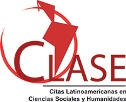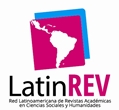Indexing
ECONOMÍA is indexed in the following indices, catalogues, directories and databases: EconLit, RePec, International Bibliography of the Social Sciences (IBSS), European Reference Index for the Humanities and Sciences (ERIH PLUS), Qualis, Emerging Source Citation Index (ESCI) of Web of Science, Latindex, Dialnet, Ebsco, Clase, Google, Gale.
|
|
|
EconLit includes the most sought-after economics publications including peer-reviewed journal articles, working papers from leading universities, PhD dissertations, books, collective volume articles, conference proceedings, and book reviews--all expertly indexed, classified, and linkable to full-text library holdings. |
|
|
|
RePEc (Research Papers in Economics) is a collaborative effort of hundreds of volunteers in 101 countries to enhance the dissemination of research in Economics and related sciences. The heart of the project is a decentralized bibliographic database of working papers, journal articles, books, books chapters and software components, all maintained by volunteers. The collected data are then used in various services that serve the collected metadata to users or enhance it. |
|
|
|
The International Bibliography of the Social Sciences (IBSS) is an essential online resource for social science and interdisciplinary research. IBSS includes over two million bibliographic references to journal articles and to books, reviews and selected chapters dating back to 1951. It is unique in its broad coverage of international material and incorporates over 100 languages and countries. Over 2,800 journals are regularly indexed and some 7,000 books are included each year. Abstracts are provided for half of all current journal articles and full text availability is continually increasing. |
|
|
|
The European Reference Index for the Humanities and the Social Sciences (ERIH PLUS) was created and developed by European researchers under the coordination of the Standing Committee for the Humanities (SCH) of the European Science Foundation (ESF). The ERIH lists, which initially covered only humanities disciplines, were first published by ESF in 2008, while revised lists were made available in 2011-2012. In 2014, responsibility for the maintenance and operation of ERIH was transferred to the NSD - Norwegian Centre for Research Data. The reference index at NSD is called ERIH PLUS in order to indicate that it has been extended to include the social sciences. |
|
|
|
Qualis is a Brazilian system for evaluating journals supported by the Coordenação de aperfeiçoamento de pessoal de nivel superior (Ministry of Education, Brazil). |
|
|
|
The Emerging Sources Citation Index (ESCI) is a citation index produced since 2015 by Thomson Reuters, and now by Clarivate Analytics. According to the publisher, the index includes "peer-reviewed publications of regional importance and in emerging scientific fields". |
|
|
|
Latindex's Catalogue 2.0, a reliable reference for high-quality academic journals in Latin America. Latindex is the result of the collaborative efforts of a network of institutions that work in a coordinated manner to collect and disseminate information on scientific serial publications. The Catalogue 2.0 highlights journals that follow strong editorial practices and prioritizes non-commercial open access publications. Latindex was created in 1995 at the National Autonomous University of Mexico (UNAM) and has operated as a regional cooperation network since 1997. |
|
|
|
Dialnet is a database maintained by the University of La Rioja. |
|
|
|
EBSCO is the leading provider of research databases, e-journals, magazine subscriptions, e-books and discovery service to libraries of all kinds. For over 70 years, EBSCO collaborated with libraries to improve research with quality content and technology. |
|
|
|
CLASE is a bibliographic database created by UNAM and contains about 330 thousand bibliographic records of publications from Latin American countries. |
|
|
|
Google Scholar is a freely accessible web search engine that indexes the full text or metadata of scholarly literature across an array of publishing formats and disciplines. |
|
|
|
GALE is database published by GALE CENGAGE. |
|
|
|
DOAJ is a community-curated online directory that indexes and provides access to high quality, open access, peer-reviewed journals. |
|
|
|
LatinREV is a latin american network conformed by academic journals publishers and scientific associations related to Social Sciences and Humanities. LatinREV is supported by FLACSO-Argentina and it's purpose is to give assessment and training about academic publishing. |
|
|
|
|
|
|














